I am watching elephants. It's a group of 16 - some young ones, a large male, slowly moving their ears to cool off. Amazingly peaceful.
They are standing in a dry wadi. Apparently there is water in some holes, because the elephants alternatingly spray themselves with dust and with water.
Just when we are adjusting to the spectacle, a giraffe climbs into the wadi.
These animals all move slowly, gracefully. Two more giraffes follow.
This morning we packed our gear on top of our landcruiser, and said goodbye to my dada. Then for half a day we head south until we reach the exit for Tarangire.
Here the road becomes gravel. Small shacks form a tiny village. Masai walk around and stand in the dust. Occasionally one or two women sit under a tree with their babies.
Boys come begging. Several times we pass groups of boys covered in pitch black blankets, their brown faces blackened by ash, or something, and on the black face is painted with very white paint a kind of skull. They stand in groups alongside the dirt road, and primarily stare.
They seem to be begging too.
After a while we reach Tarangire National Park, where twenty or more landcruisers and other safari vehicles are parked. The local drivers are registering the vehicles and passengers.
Didi and I also fill in a form in a tent crowded with drivers and official - some hard to recognize as such, because they wear only vestiges of uniforms, and some t-shirts.
Paying takes more than an hour of standing in line. I end up talking a lot with other people who are waiting, all locals, who tell me a lot about the parks and policies, and teach me some Swahili. But finally then we have our permit.
Hardly ten minutes into the park we see our first wildebeest.
The landscape is mostly savanna grass with single trees of clumps of trees, where animals can hide. The temperature is about 25C and it is very dry, so cars throw up a lot of dust.
The public campground is six kilometer into the park, where a boy in t-shirt offers to find me firewood for a campfire for $20. I tell him we are not interested. Later we discover he is an official guardian of this campground.
There are no fences or sites, we pitch the tents where we want.
There is an enclosed, caged classroom -sized place for cooking, and a concrete platform with a metal roof and some tables for eating. There are also showers, but no working outlets, so we cannot charge anything.
We pitch the tents and after a quick sandwich we start driving through the park. You are not allowed to leave the vehicle, so from our open windows we take our pictures.
The paths are all dirt roads, some narrow because of thorny bushes on both sides.
There is a true abundance of animals, ranging from colorful birds, to all kind of gazelle type animals to the large giraffe and elephant.
At some places we park the car and just sit and watch for half an hour or so. In the sun it gets hot, and by the time the sun goes down, we return to the camp (one is not allowed outside the camps at night.)
In the cooking area a dozen black cooks is cooking for their white clients. We join them, and soon our spaghetti is ready. Some cooks are fully engaged, with boxes full of spices and four course dinners.
In the darkness, a lady ranger with a gun tells me there are lions about.
'Can we leave the tent at night? '
'Yes, but first check with your flashlight if there are lions. Then walk slowly, and don't shout if you see one. The shout may show your fear, and that calls the lion.'
The whole night, amidst all the noises, I listen for that deep growl, that announces the arrival of the king of the jungle...

 Tarangire National Park, United Arab Emirates
Tarangire National Park, United Arab Emirates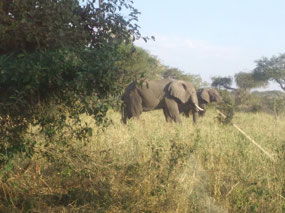
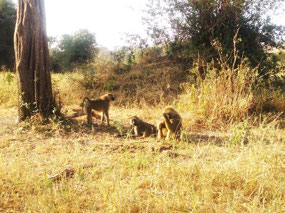
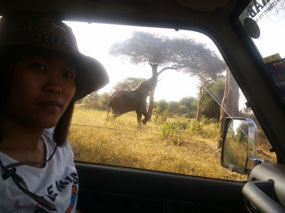





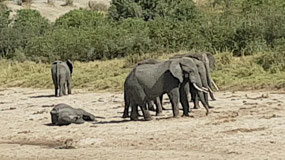
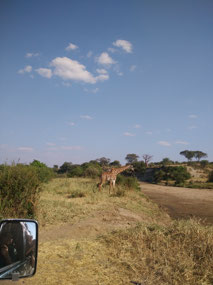
2025-05-23